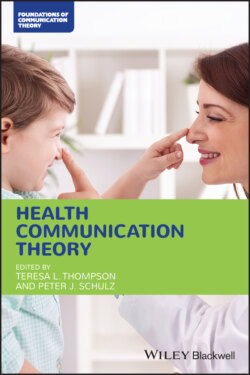Читать книгу Health Communication Theory - Группа авторов - Страница 27
Locus of Control
ОглавлениеAnother individual difference variable to consider when segmenting an audience is locus of control, which refers to individuals’ acknowledgement of accountability for their life outcomes (Latimer, Katulak, Mowad, and Salovey 2005). The term locus of control was coined by Rotter (1966) more than five decades ago and refers to the degree individuals feel their life circumstances result from their actions and characteristics or are due to external forces considered to be out of their control such as chance, luck, or powerful others. Said differently, locus of control captures the extent to which people believe events in their life are caused by their actions or circumstances outside of their control (Kim and Baek 2019). The former is referred to as internal control whereas the latter reflects external control. Within the context of health outcomes, Wallston, Wallston, and DeVellis (1978) developed the multidimensional health locus of control scale. Health locus of controls reflects the degree to which people feel their health outcomes are contingent on their behavior or the behavior of others or the environment (Kannan and and Veazie 2015). The scale consists of three dimensions including internality (i.e. health outcomes are internally based and our individual responsibility) and externality, which features both chance (i.e. health outcomes are due to fate and out of our control) and powerful others (i.e. health outcomes are determined by powerful others such as a physician and thereby out of our control).
Locus of control is important to health practitioners considering its relation to a myriad of important behavior change variables. For instance, Brehm and Brehm (1981) identified locus of control as an individual difference variable closely linked to psychological reactance. Reactance is conceptualized as an aversive motivational state emanating from a threatened or eliminated freedom (Brehm 1966). Despite a cogent theoretical connection between locus of control and reactance, we are aware of only one study to examine the association between these theoretical constructs (Xu 2017). Xu demonstrated a stronger association between controlling language and reactance among individuals with an internal, as opposed to an external, locus of control. Delivering messages congruent with one’s locus of control beliefs stands as a fruitful approach to mitigating reactance following experimental work by Latimer and colleagues (2005). For example, it is reasonable to expect delivering a personal responsibility message to people with an internal locus of control while at the same time disseminating a health care provider responsibility message to those favoring an external locus of control would mitigate the reactance experienced. Although matching messages to one’s controllability beliefs is intuitively appealing, a fear persists that people with an external locus of control mindset may lack confidence in their ability to avoid aversive health complications (Booth‐Butterfield, Anderson, and Booth‐Butterfield 2000).
The relationship between an internal locus of control and self‐efficacy continues to emerge within the literature. Specifically, research has found the controllability of health outcomes beliefs is positively linked to increased self‐efficacy among individuals (Armitage 2003). For example, within the context of parental alcoholism effects on their adult children, Richards and Nelson (2012) discovered a positive association between self‐efficacy and an internal locus of control whereas a negative association emerged for individuals with an external locus of control. Health practitioners must remain aware of the positive association between control beliefs and one’s confidence in performing an advocated behavior. Moreover, maintaining an internal locus of control is positively correlated with conscientiousness and overall life satisfaction (Morrison 1997). Interestingly, recent research has connected heavy television viewers to maintaining an external locus of control (Kim and Baek 2019). Health promotion messages delivered to people with an external locus of control should emphasize self‐ and response efficacy through modeling as well as identifiable narratives in order to increase adoption rates. However, a heightened internal locus of control can have a downside. There remains speculation that an elevated internal locus of control could be positively associated with increased anxiety and unreasonable self‐blame (Richards and Nelson 2012). Future research should continue to investigate the benefits and costs with both a heightened internal or external locus of control. Taking the range of locus of control into consideration is important for health practitioners. Equally important is to consider one’s resistance to influential attempts as is discussed with the next individual difference variable, reactance proneness.
